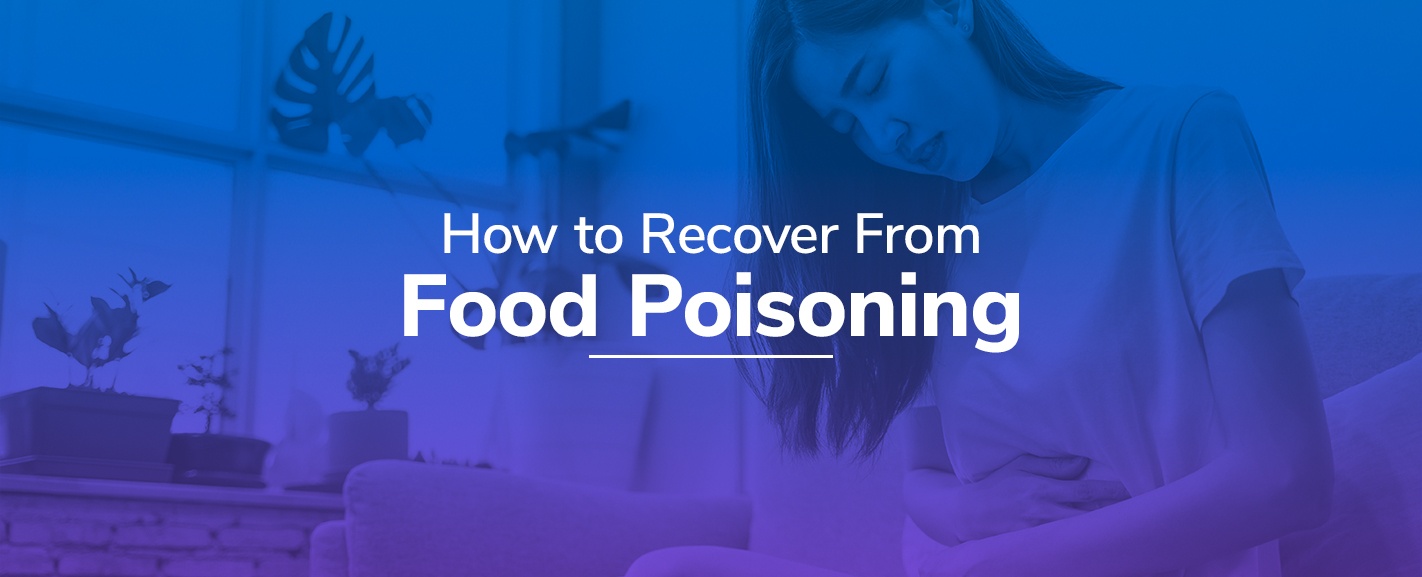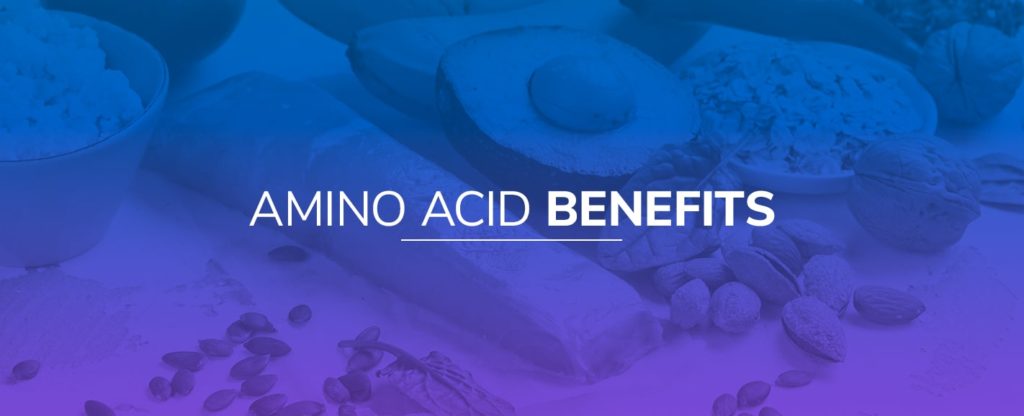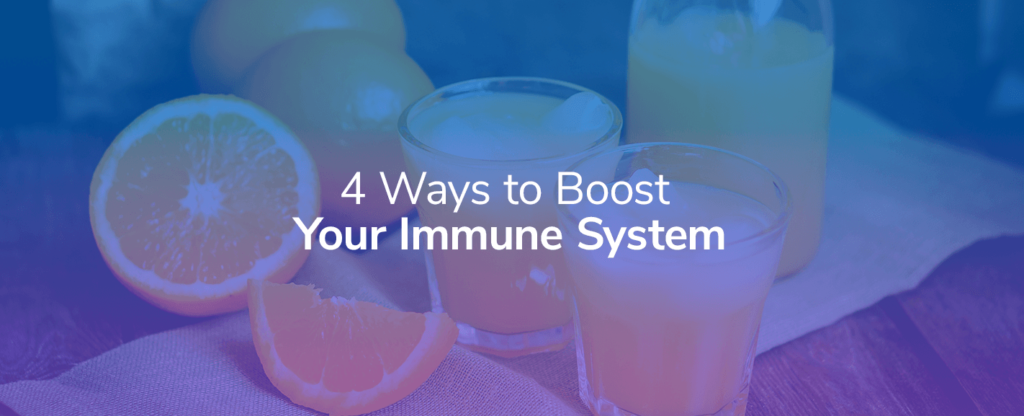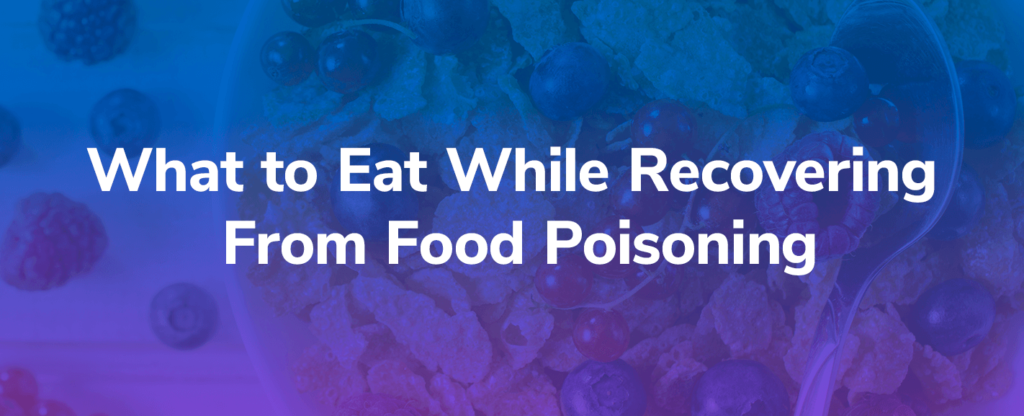According to the Centers for Disease Control and Prevention (CDC), approximately one in six Americans will get food poisoning at some point this year. Based on these numbers, it’s no surprise that any remedy to cure or prevent food poisoning so fast is consistently in demand.
If you’re looking for a quick and effective way to get rid of your food poisoning ailments, you’ve come to the right place. Keep reading to discover how to not eat foods, recognize the signs and symptoms of food poisoning, and recover from the sickness as quickly and comfortably as possible.
Food poisoning, also known as foodborne illness, is a result of eating contaminated food. The most common food contaminants are infectious organisms, such as bacteria, parasites, viruses, and their toxins.
These infectious organisms and their toxins can taint food at any point during its processing or production, as well as whenever you incorrectly handle or cook raw food even in your own kitchen.
Most often, raw or undercooked poultry or meat, raw vegetables, and improperly handled produce are to blame for cases of foodborne illness.
When you eat contaminated food it can be serious but most food poisoning cases only last for a couple of days and don’t require serious further medical treatment or attention.
Signs and Food Poisoning Symptoms
Foodborne illnesses can come at you fast. Most of the time, caused by raw or undercooked meat, becoming sick with a food-borne illness can be inconvenient, to say the least.
Typically within a few hours, of eating a contaminated piece of food.
Although the exact effects and common symptoms of eating food that is contaminated or other food-derived poisoning may vary depending on the source or contamination, most types share similar symptoms.
Pay attention to these signs of food poisoning:
- Vomiting
- Watery or bloody diarrhea
- Nausea
- Fever
- Abdominal cramps and pains
If you experience any of the symptoms listed above, think back over what you ate most recently.
Consider whether you consumed any meat, undercooked shellfish, dairy products like unpasteurized milk, raw eggs, fruits, vegetables, or any other food product that may not have been cooked, cleaned, or handled properly.
If your food history and symptoms match up, you most likely have a case of some type of foodborne illness.
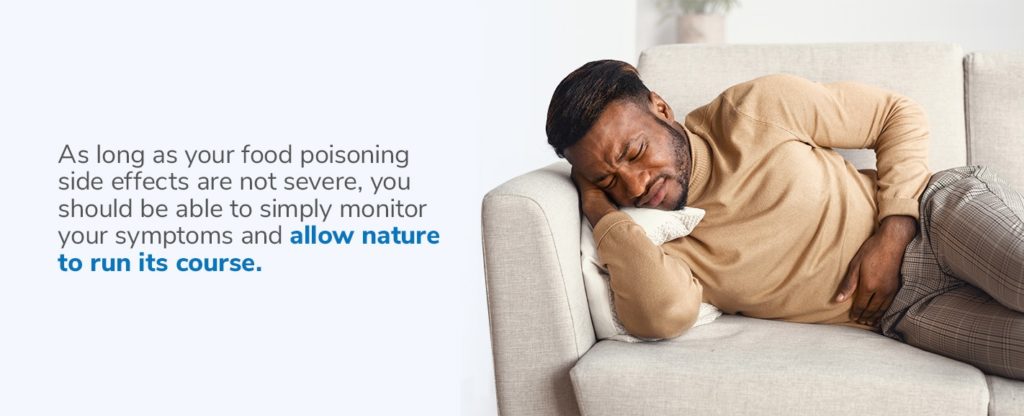
How to Recover From Food Poisoning
Once you’ve determined you have food poisoning, you can start figuring out how to treat the illness. In most cases of foodborne illness, you won’t be able to do much about the sickness and you’ll naturally start feeling better within a matter of days.
During this time, you should do your best to rest, relax, and drink plenty of fluids to help your digestive system and immune systems of your body recover.
As long as your food poisoning side effects are not severe, you should be able to simply monitor your symptoms and allow nature to run its course.
Eating Food After a Food Poisoning Diagnosis
Recovering from food poisoning can be a challenging experience, but reintroducing food into your diet doesn’t have to be daunting. The key is to start with bland, easy-to-digest foods to ease your stomach back into its routine. Opt for plain options like toast, rice, or bananas, which are gentle on your system and provide essential nutrients.
It’s also crucial to stay hydrated; sipping on clear broths or herbal teas can help replenish fluids and electrolytes lost during the illness. As you regain strength, gradually incorporate more substantial foods, but listen to your body and pace yourself.
Small, frequent meals are preferable to avoid overwhelming your digestive system. Remember, recovery is a gradual process, and it’s essential to give your body the time it needs to heal fully. So, take it slow, choose bland, nourishing foods, and you’ll be back to your healthy self in no time.
Should I Take Food Poisoning Medication?
You’ll want to avoid taking any over-the-counter medications for diarrhea because the diarrhea helps to clear your system of whatever is making you sick. If your foodborne illness is from a virus, taking medication to treat diarrhea won’t help you either.
However, more serious cases of food poisoning may require professional medical attention and specific prescriptions or antibiotics to prevent any further complications.
Contact your doctor if your vomiting or diarrhea persists for more than three days, you have an exceptionally high fever or you experience any weakness or tingling in your arms.
How To Treat Food Poisoning At Home
As you’re waiting for your foodborne illness to subside, you can take particular measures to mitigate your pain and symptoms. Doing whatever you can to keep your food poisoning in check will also boost your weakened immune system and promote recovery.
Most importantly, your main job will be drinking plenty of fluids. Taking in fluids throughout the day will help prevent dehydration, which can be a side effect of prolonged diarrhea or vomiting. Staying hydrated is key to overcoming food poisoning because your body needs enough fluids to function properly and heal itself.
Along with drinking fluids, follow these at-home tips to help your body fight off food poisoning:
- Allow your stomach to calm down: After experiencing the first effects of foodborne illness, stop eating for a few hours to let your stomach settle down.
- Diversify your fluids: Drink plenty of water, broth, and electrolytes to prevent dehydration. Electrolytes are minerals like potassium and sodium that help regulate how much water is in your body and replace the minerals you lose from diarrhea and vomiting.
- Drink ginger tea: Drinking ginger tea can help relieve some symptoms due to its soothing properties.
- Get plenty of rest: Make sure you give your body the rest it needs to recover.
- Ease back into eating: Once you feel up to it, start snacking on small amounts of bland food, nonfatty foods like crackers, toast, cereal, oatmeal, and rice.
- Avoid potentially irritating foods: Stay away from dairy, fatty, and spicy foods because they can aggravate and worsen certain foodborne poisoning symptoms. In addition, avoid caffeine, alcohol, and fizzy and bubbly drinks, which will also make your symptoms worse.
- Take a shower: Showering can help cleanse your body of unhealthy bacteria due to foodborne illness.
Treat Food Poisoning Fast With IV Therapy
The fastest way to replace lost fluids and remedy severe dehydration, due to foodborne illness is intravenous (IV) therapy.
IV therapy delivers fluids directly to the bloodstream so your body can absorb them more quickly. In some cases, you may experience the positive effects of IV therapy almost immediately.
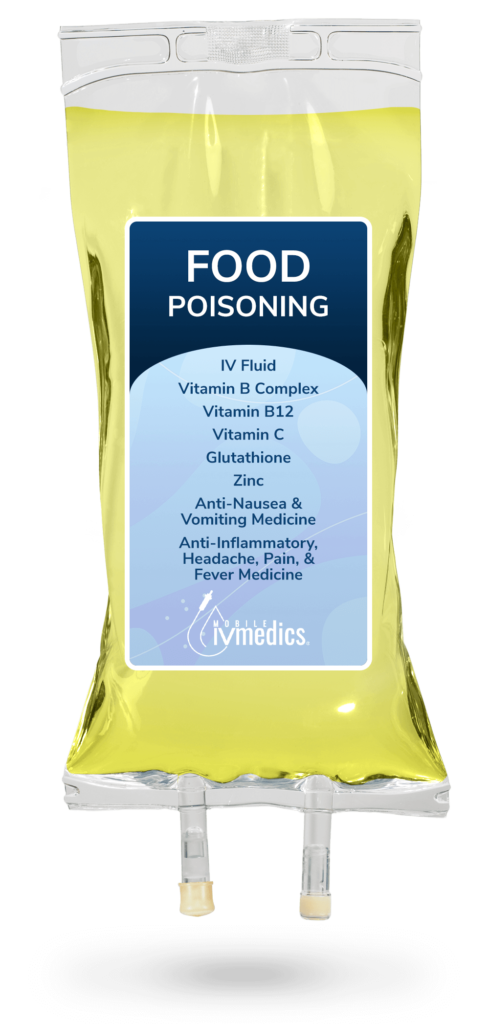
Specifically for food safety, an IV package designed for food poisoning will contain certain vitamins, minerals, and nutrients to alleviate foodborne illness symptoms. The key ingredients of a food poisoning IV package include:
- IV fluid: IV fluid helps rehydrate the body as quickly as possible so the immune system can perform at its best. Receiving fluids via IV therapy is a great option for a foodborne illness patient because drinking something is usually not appealing to anyone with nausea.
- Vitamin B complex: B vitamins are crucial for proper immune system function and energy levels. Specifically, vitamin B6 helps your immune cells fend off infection.
- Vitamin B12: Another potent B vitamin, called vitamin B12, helps increase the number of immune system cells within the body, which aids in raising your innate and adaptive immunity.
- Vitamin C: Vitamin C also supports the functions of both innate and adaptive immunity. Upping your vitamin C intake will decrease your risk of developing an infection by bolstering your immune system.
- Glutathione: This powerhouse of a molecule is a strong anti-inflammatory agent that helps treat aches and pains while preventing future sicknesses.
- Zinc: This important mineral helps your immune cells function at their best so you can recover more quickly and experience less severe symptoms.
- Anti-nausea and vomiting medicine: If your foodborne illness is causing queasiness and vomiting, this medicine will help relieve these symptoms by blocking the transmission of the signals in the nervous system that lead to an upset stomach.
- Anti-heartburn and reflux medicine: If excessive vomiting from food poisoning has made your esophagus burn, this medicine can provide relief by temporarily decreasing the amount of acid secreted in your stomach.
- Anti-inflammatory, headache, pain, and fever medicine: Whether you’re experiencing a headache, fever, or general aches and pains, this medicine will have you feeling better quickly by reducing the amount of inflammation in your body.
By combining all of these effective ingredients, a food poisoning IV package can help you feel more like yourself in no time. Depending on your needs and symptoms to avoid food poisoning, you can also customize your IV therapy package to include other nutrients or medications you might benefit from.
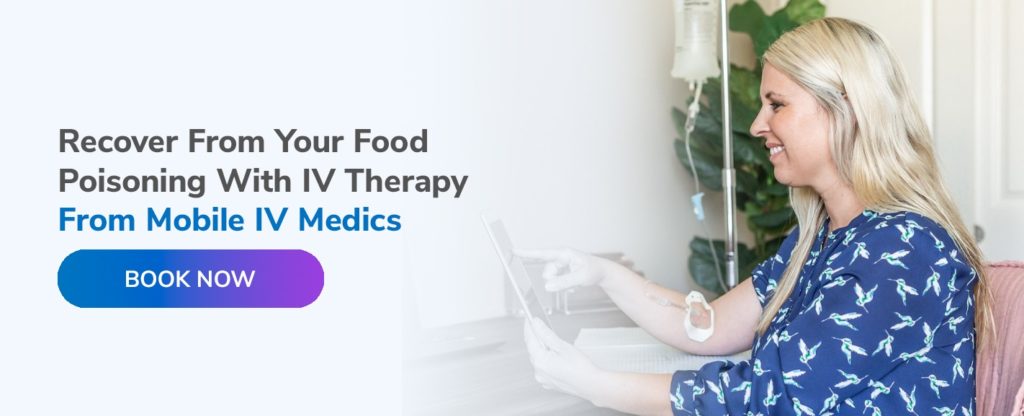
Recover From Food Poisoning Faster With IV Therapy From Mobile IV Medics
If you’ve got a bad case of food poisoning, you can relieve your symptoms fast with IV therapy from Mobile IV Medics in California, Colorado, Florida, Georgia, Illinois, Nevada, Pennsylvania, Tennessee, or Texas.
We understand that the last thing you want to do is drag yourself to a doctor’s appointment when you have a foodborne illness, which is why our registered nurses come directly to your home to administer your IV.
Book an appointment with us at Mobile IV Medics now to receive fast and effective IV therapy for food poisoning within the hour.
Additional Resources & Related Articles:
- Fast Stomach Flu Treatment
- How to Properly Rehydrate After Diarrhea or Vomiting
- What Is IV Therapy?
- Food Poisoning IV Drip Treatment
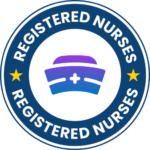
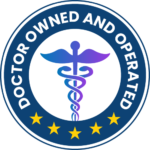
Resources:
- https://www.cdc.gov/foodsafety/cdc-and-food-safety.html
- https://www.mayoclinic.org/diseases-conditions/food-poisoning/symptoms-causes/syc-20356230
- https://www.healthline.com/health/food-nutrition/what-to-eat-after-food-poisoning
- https://www.oftlaw.com/blog/can-i-take-over-the-counter-medications-for-food-poisoning
- https://www.webmd.com/digestive-disorders/remedies-for-food-poisoning
